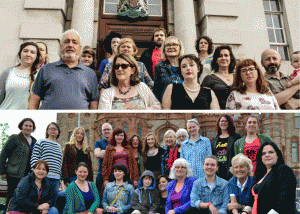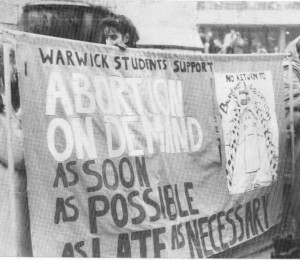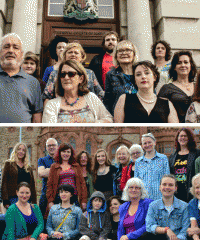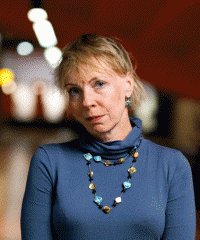
Cathy Warwick

Professor Cathy Warwick CBE is Chief Executive of the Royal College of Midwives, and works to promote women-centred care and informed choice in all aspects of reproductive health. From improving perinatal mental health services to addressing the shortage of midwives in the NHS, Cathy has put maternity care firmly on the political agenda, and acts as a vocal advocate for pregnant women’s right to individualised, respectful care. Read Cathy’s piece about how important choice is in maternity care here.
Dr Ellie Cannon

A GP and broadcaster who regularly tackles misinformation masquerading as science, Ellie has also authored Keep Calm: The New Mum’s Manual. In a society swarming with confusing, conflicting advice which fills mothers with guilt and fear of “getting it wrong”, Ellie encourages women to trust their own instincts and make the choices that are right for them and their family.
Diane Munday, ALRA: Putting The Power Where It Rightly Belongs – Why We Need To Decriminalise Abortion
Diane Munday was the General Secretary of the Abortion Law Reform Association in the 1960s which helped make the 1967 Abortion Act possible. A lifelong activist, Diane writes here about why we now need to remove abortion from the criminal law altogether.
I am both proud and appalled that, more than 50 years after I first started campaigning for women to be able to choose whether or not to continue with a pregnancy, I have been invited to be a Champion of Choice.
Proud because I (and the others – many sadly now dead) who struggled so long and hard for the 1967 Abortion Act to be passed and retained have not been forgotten. Appalled because Britain, having been a European pioneer in liberalising draconian laws, now lags behind most of the civilised world by placing the decision as to whether or not to become a mother in the hands of doctors and not in the hands of the pregnant woman herself.
Even when, in 1966, we were sitting on the Terrace of the Houses of Parliament with our champagne and strawberries celebrating victory after the last, long all night debate I was very aware that the job was only half done. But, little did I guess, that nearly half a century later it would remain that way. Medicine, technology and women’s rights have moved on in ways we could not have imagined but Parliament remains stuck in the past as far as this aspect of reproductive rights is concerned.
Many who now benefit from the 67 Act were not alive when the struggles for its enactment took place and some question how those fighting for “women’s rights” could have welcomed a law hampered by such restrictions. The simple answer to that question is: it was that or nothing!
I still vividly remember hours of horse trading, in stuffy, smoke filled rooms in Westminster, clause for clause, with MPs, representatives of the churches and of the medical professions trying to hammer out something that was acceptable to a majority, And I also still remember how much it hurt when later a younger generation of reformers accused us oldies of “selling women down the river”.
But now, if every woman who has had a safe, legal abortion (and it is estimated that one in three women in Britain will have an abortion during her reproductive years) would write to her MP pressing for abortion to be removed from the realm of criminal law, it would be hard for Westminster to go on ignoring the long overdue need for medically performed abortions to be controlled only in the same way as any other medical procedure.
So I welcome this wake-up initiative from the British Pregnancy Advisory Service – which I helped to found and for whom I worked for many years –in advocating the bringing of our abortion practices into the 21st century by decriminalising the voluntary ending of a pregnancy and thus putting the power where it rightly belongs – namely, in the hands of women themselves
Sarah Wright, Alliance for Choice: Why I asked to be arrested for breaking Northern Ireland’s abortion laws.
Sarah Wright is a pro-choice activist in Northern Ireland and is one of the 215 campaigners who signed an open letter from Alliance for Choice to challenge the Northern Irish abortion laws.
On the 24th June 2015, I proudly joined over 200 individuals in a direct challenge to Northern Irish abortion laws, by signing an open letter from Alliance for Choice indicating that I had helped women access abortion pills. This was a repeat public action similar to the letter published in 2013, as a response to the Department of Health’s inadequate draft abortion guidelines. We repeated this challenge because a woman has gone on trial for accessing pills for her daughter, the first case of its kind in the region within my lifetime. The ‘poison or noxious substance’ the woman is accused of procuring, Mifepristone and Misoprostol, appear on the WHO’s list of essential medicines, and are the same pills women, and anyone who can experience a pregnancy, receive if they travel to Great Britain for a termination or if they have an incomplete miscarriage and present at an Accident and Emergency department. Accessing terminations illegally in Northern Ireland, facilitated by others, is something thousands have done and continue to do each year, often shrouded in secrecy. Why should this woman, in particular, be targeted?

Women in Northern Ireland are routinely dehumanised and degraded upon becoming pregnant. The law here, dating from 1861, is not on par with the rest of the United Kingdom and criminalises women who access reproductive healthcare, even in the most extreme cases. Abortions provided here on the NHS, under severe restrictions, have decreased in part due to a lack of guidelines for practitioners as to what constitutes a legal abortion and harsh criminal penalties, but primarily due to women taking their reproductive healthcare into their own hands. There has been no decrease in demand for abortion. Increasing numbers of women are accessing safe but ‘illegal’ pills online via Women on Web and Women Help Women. Abortion access is a class issue in Northern Ireland – women who have the financial means, travel and access terminations, those who don’t, have babies.
The Northern Ireland Assembly has shirked its responsibility to provide adequate medical care and guidance to women for too long. Indeed, abortion is the one of the only issues which unites both sides of the religious and political divides. Amnesty International NI launched the #MyBodyMyRights campaign last year to challenge the current ‘draconian’ abortion law, emphasising it’s noncompliance with international human rights standards. Their report highlights how women in Northern Ireland are treated as merely ‘child-bearing vessels.’ Meanwhile, we are waiting impatiently for the Belfast High Court to decide whether abortion is legal to access in cases of rape, incest and fatal foetal abnormality. Criminalisation has not and will not eradicate abortion in this part of the world or any other; rather it forces women to access unsafe abortions and women die.
To coincide with the call for the decriminalisation of abortion in the BPAS Charter for Choice, I call upon the Public Prosecution Service for Northern Ireland to drop all charges against the women on trial for providing safe pills to her daughter. I call on the Assembly to act to provide free, safe and legal abortions for women in Northern Ireland. I call on comrades across the United Kingdom to join our campaign. We don’t have bodily autonomy yet, but we can and we will with your support.
If you are under 9 weeks pregnant and living in Northern Ireland, please visit Women on Web or Women Help Women for access to an Early Medical Abortion. If you are over 9 weeks pregnant, please visit Abortion Support Network for information on travelling to the UK for a termination.
To support these organisations, which have been a lifeline to women in Northern Ireland when our government continues to fail us, please consider making a donation, if you are able to – Women on Web, Women Help Women or Abortion Support Network.
Photo taken by Tyler McNally
Lisa Hallgarten, Voice for Choice: Why we need to continue the fight for abortion rights.
Lisa is Chair of Voice for Choice and works tirelessly to ensure that women have choice on abortion.
Last month I was in Dublin and I dropped in on an Abortion Rights Campaign meeting to bring greetings and an expression of solidarity from Voice for Choice in the UK. The room was buzzing – with organisers running around trying to locate more chairs as an unprecedented and unexpected number of people piled into the room. Change is coming in Ireland and the desire for and expectation of progress was palpable. Amnesty International had just launched its My Body My Rights report on Ireland highlighting the ways in which Irish abortion law punishes women and contravenes their human rights. Just a few days earlier the referendum on equal marriage had given a resounding YES to equal rights, and a resounding ‘whatever’ to the conservative forces resisting progress. That referendum campaign seemed to beg the question ‘what about the other referendum we want: the one to repeal the 8th Amendment?’
I told the meeting how confident I am that they will win their struggle for women’s reproductive rights in Ireland, but even when they win, they should expect to be in it for the long haul.
Although the UK Abortion Act is widely believed to be one of the most important and progressive pieces of public health legislation in this country, since it was passed in 1967 there have been countless attempts to amend it in Parliament and slur it in the media. I first got involved in campaigning for abortion rights in 1987 when the then Liberal MP David Alton was attempting to reduce the abortion time limit to 18 weeks. Since then I have participated in campaigns against several more time limit attacks, attempts to obstruct the process of seeking abortion, and a recent attempt to undermine some of the key principles of the Act by anti-abortion MPs. Even though most people in the UK (yes including Northern Ireland) think that abortion should be safe, legal and available, and even though we will be celebrating its 50th birthday in 1967, the war of attrition against the Abortion Act continues unabated.

Alongside parliamentary work and supporting colleagues in Northern Ireland campaigning for legal abortion there, we have to be staunch and outspoken advocates of all the women who choose abortion for a multitude of ordinary, sometimes extraordinary and always very personal reasons. We have to continue to fight the stigma surrounding abortion and continue combating the everyday misinformation that attaches itself to the topic. We have to support and celebrate our abortion providers, and ensure there’s a new generation of them coming through. We have to make sure our young people are getting the information they need as part of comprehensive and universal sex and relationships education to prevent unwanted pregnancies and to know that parenting and abortion are both valid options if they can’t.
The new Charter for Choice campaign looks forward to a future in which every aspect of reproductive health care is shaped around and respects people’s individual needs and choices; and one in which unintended pregnancy and abortion are not privileged as the controversial issues, but are seen as just another of the many sometimes straightforward and sometimes difficult choices ordinary woman might be confronted with across their whole reproductive lifespans.
This future isn’t going to fall into our laps though. There will be a small, but vocal minority who will resist progress and will fight us every step of the way. So, as the late great Curtis Mayfield once sang, we better ‘keep on keeping on’. I will if you will.
Clare Murphy, bpas: Women’s Reproductive Rights Are At Risk – Let’s Stand Up For Choice
Clare Murphy is the Director of External Affairs at bpas. This piece was originally published on Huffington Post.
Today the British Pregnancy Advisory Service launches our Charter For Choice. It lays out our key demands to protect and extend women’s reproductive choices, which are sadly so often under assault across the UK today. It recognises that the same principles of choice and autonomy must underpin women’s reproductive health services at every stage of her life journey. We may see them as disparate, but decisions ranging from which contraception to use to whether you breastfeed your baby are all reproductive choices, and we need to stand up for women’s right to make them by themselves and for themselves – not in accordance with anyone else’s agenda.
At the heart of our charter is a commitment to putting women at the heart of reproductive decision-making. From taking abortion out of the criminal law to bring it in line with other women’s healthcare procedures to ensuring women have impartial, evidence-based information on which to make their own decisions about pregnancy and birth, we need frameworks that recognise women as autonomous individuals capable of making their own minds about their own bodies. It is scandalous that in 2015, women still have to explain the vagaries of their sex life to a stranger in a pharmacy in order to obtain an emergency contraceptive pill that is safer than many of the medicines you can buy straight off the shelf, no questions asked. It is frankly insulting that some don’t believe pregnant women are capable of differentiating between a glass and the best part of a bottle of wine, and so must be advised to abstain altogether.
And if women are to be trusted to make decisions about their own bodies and births – we need the services in place to support their choices.
While many early abortions can now be carried out with pills outside hospital settings, there remains a pressing need for hospital doctors trained in surgical procedures and able to care for increasing numbers of women with complex health needs, for whom continuation of a pregnancy would be catastrophic for their health. While we regularly lament women’s suffering in “abortion free” Ireland, we should note that in the UK today, women are being compelled to continue pregnancies they do not want and which will harm their health because they cannot find a doctor to help them.
Choice in birth, whether refusing intervention or requesting it, whether at home or in hospital, must also be paramount. More women are having children later in life, as women’s optimum age of childbearing often does not co-incide with the optimum time in that particular woman’s life for her to have a baby. Some of these women, and younger ones too, will need IVF services – and yet many areas are failing to provide the full 3 cycles of treatment that have been recommended by NICE. While the difficulties of conceiving and risks of pregnancy and birth for women over 35 must never be overstated, we need maternity services that can cater for the more complex pregnancies of some older women.
The launch of our charter is also a chance to hail the amazing work being done by so many – our Champions of Choice. From the brave activists in Northern Ireland challenging the province’s archaic and cruel abortion restrictions so women can end their pregnancies, to the dedicated charity helpline workers doing everything to ensure women with appalling pregnancy sickness can access the medications they need to continue their pregnancies, there are campaigners and healthcare workers across our country doing their utmost for women’s choice.
We want to hear about champions everywhere. Had a great midwife? Feel your MP is out there standing up for women? Want to show your support for a local campaigner? Let us know, so we can celebrate their commitment to women’s choice – and in the meantime show yours by signing the Charter for Choice.
Cathy Warwick, Royal College of Midwives: Why Choice Matters In Maternity Care
Professor Cathy Warwick CBE is the Chief Executive of The Royal College of Midwives and passionately advocates for woman-centred maternity care that respects the needs and experiences of the individual.
A major strength of maternity services policy in the United Kingdom is that, at its heart, is an acceptance by policy makers and professionals that women should have the right to make their own choices about the care they receive. Every woman is an individual who brings to pregnancy and childbirth her unique experiences which will shape her decisions around this life changing time. It is accepted that the role of the midwife or the doctor is to work in partnership with each woman helping her to understand the vast amount of information that she will receive, how it applies to her and ultimately to make her own choices from a range of possible options. We know from surveys that when women feel involved in decision making and feel they have been respected in their choices they are more satisfied with their experience of pregnancy and birth. This in turns means they can embark positively on motherhood.
However it won’t come as a surprise to hear that whilst it is very easy to talk about women centred care in theoretical terms, implementing such care can be a challenge and although across the UK there are many many examples of excellent practice there is still work to be done if all women are to receive such care.
The barriers to choice are many and varied. At the highest level one problem is that a woman’s right to choose is not enshrined in law. What happens therefore if a woman says she would like to choose a homebirth but the local maternity service says they have not enough midwives to provide this service? Perhaps one day this will be tested in court. When this has happened in other European countries the woman’s right to choose has been upheld.
This highlights however that often resource constraints are barriers to choice. How can professionals really work in partnership with women if there are simply not enough of them? When resources are short options tend to narrow down. Despite welcome increases in the numbers of midwives working in the UK we remain short of midwives and the pressure on their time is enormous.
Then there is the knotty problem of ‘the wrong choice’. Despite the rhetoric professionals can find it hard to support choices that they do not themselves believe are in women’s best interest and when safety is in question they may ask whether they are obliged to support a choice that they believe is unsafe. For example the healthy fit young woman who chooses to have her baby by elective caesarean or the third time mother choosing a birth at home having had two prior caesarean sections. Tensions between woman and professional can mount and need very careful handling.
And finally the issue of equality raises its head. If we really value choice and believe all women should be given choice we have to recognise diversity. Not all women start from the same place. Some women don’t even know how to access maternity care far less make choices within it. Some women will need interpreters. Other women will need additional support because of disability. We need to ensure all women are given the help they need if they are to get what the care that works for them.
Choice matters. It empowers women in the widest sense. Care should always be individualised and respectful. Many in the UK believe that a principle of choice is inherent in our maternity services but whilst this is true in theory in truth we still have some way to go to ensure this is true in practice. That is why I remain in my work a Champion of Choice.
The 215 NI Abortion Rights Activists

These 215 extremely brave individuals in Northern Ireland who signed an open letter admitting to either the consumption of abortion pills, or assisting women in the procurement of an abortion, in response to the prosecution of a women in her thirties accused of buying abortion pills for her daughter, are an inspiration to all campaigners for reproductive choice. By inviting prosecution these abortion rights activists have highlighted how unfair this case is and have courageously challenged Northern Ireland’s draconian abortion laws which makes criminals out of innocent women. This terrible trial highlights why abortion needs to be taken out of the criminal law and makes these 215 campaigners fundamental Champions of Choice for the decriminalisation of abortion. Read a piece by one of the activists Sarah Wright on why she asked to be arrested for breaking Northern Ireland’s abortion laws.
Caroline Criado-Perez

@CCriadoPerez nominated by @ob_katherine
For pro-choice campaigners like myself, having a feminist firebrand like Caroline Criado-Perez fighting for abortion rights is incredibly important. Caroline reaches thousands with her passionate pieces advocating for women’s reproductive rights and calling out the archaic sexism which still pervades our society’s treatment of women’s bodies and their sexuality. Caroline recently wrote that we need to rock the boat on our abortion law, and with her on our side I feel like we really can do it.
Ann Furedi

Ann Furedi nominated by Shaheen Hashmat
Ann Furedi has been a champion of women’s reproductive choice for a great many years, and her career to date demonstrates a lifelong passion for women’s rights. As CEO of bpas, not only is she responsible for overseeing the provision and protection of a service which is continually under threat by the pro-life lobby, she is also unafraid to take on the difficult questions about abortion. What’s right for one woman is rarely (if ever) right for all women – and Ann’s staunch defence of the right to choose is admirable.
